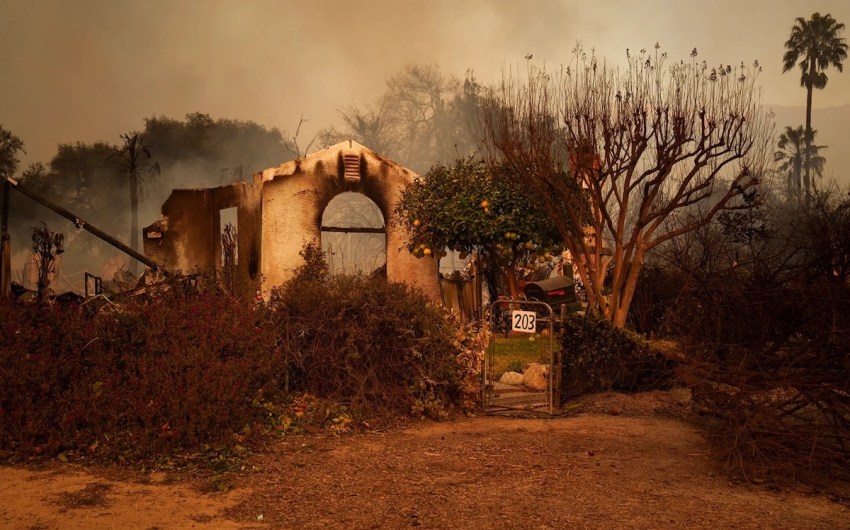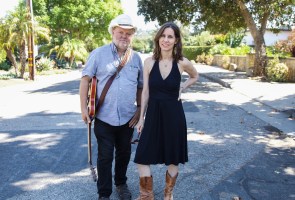Wildlife Photographer Ian Shive Brings Faraway Experiences Back Home
Award-Winning Santa Ynez Filmmaker and Photographer Highlights Two Decades of His Work and New Project in His Own Backyard

Read all of our 2024 Pets & Animals stories here.
Award-winning filmmaker and photographer Ian Shive, a Santa Ynez resident, has captivated audiences worldwide with his unique footage of the expansive National Wildlife Refuge System — including sleek manta rays floating through the waters off remote islands, gorgeous aerial views of snow-capped mountains, and sneaky Channel Islands foxes found nowhere else in the world.
Shive has encountered wildlife and ventured to places that few people have ever seen. However, his next big project is based at home — a documentary about the Santa Barbara Wildlife Care Network (WCN), and the round-the-clock work they do to rehabilitate Santa Barbara County’s sick and injured native wildlife.

Visiting the Unvisitable
Last Thursday, May 9, Shive highlighted two decades of his best work in WCN’s first Wild Talks event of the year, in partnership with the U.S. National Wildlife Refuge Association. He shared tales from the vibrant coral reefs of Palmyra Atoll to the rugged expanses of the Aleutian Islands — two historical WWII sites, now largely impenetrable and untouched by the outside world.
Shive explained that “blood, sweat, and tears” go into his images. Literally. He often leaves photoshoots with a new scrape or bruise. He approaches his photography with the thought, “What is the most absurd thing I can do, at the most absurd time of the year?”
That has led to him hanging out of an airplane door in 60-below temperatures, snot frozen on his face, trying to achieve the perfect shot of an Alaskan mountain range freshly coated with layers of snow.
Although he got his start with “calendar images,” his work has since achieved a greater depth — sometimes reaching below sea level. Last Thursday, he focused on themes of connection, often juxtaposing “two different worlds” within one or a series of photos.
His career really began in the Midway Atoll National Island Refuge, part of the Papahānaumokuākea Marine National Monument. From 1941 until 1993, the atoll housed a naval air facility that was a crucial site in the Battle of Midway in 1942.
Now a refuge for nesting seabirds, the atoll is cut off to visitors, with the only people on the islands being U.S. Fish and Wildlife Service (F&W) staff and contract workers. But its military history can still be found in the ammo shells that are dislodged from the reef’s sandy bottom after storms, alongside the airstrip that still sits on Sand Island.
Wanting to help F&W foster awareness around the national refuge system, Shive traveled to Midway and the nation’s other most remote parks to tell their stories. On Midway, he photographed nesting albatross, which deeply touched him. Albatross, he said, are one of the most monogamous animals, describing them as “super caring” and affectionate toward their young.
“There’s emotional intelligence there,” he said of the birds, displaying a photo of a mother gently preening her chick.
There is also a dual world. One of Shive’s photos showed Wisdom, a Laysan albatross, or mōlī, who lives in the Midway Atoll and is the oldest confirmed wild bird in the world.
Still alive, Wisdom is at least 72 years old, and is still laying eggs as of 2020. Although her lifelong mate is believed to have passed away a few years ago, this grandma was recently observed putting herself back on the market and flirting with other birds on the island.
On the other side, his images showed the decaying bodies of dead albatross, with bright, undigested pieces of plastic still sitting in their stomachs. He captures heartbreaking and incredible images, but those images tell heartbreaking and incredible wildlife stories, as well.


Our Own Backyards
Now, Shive is working with WCN to tell local stories in the upcoming film Wild Rescue: A Second Chance at a Wild Life. The nonprofit started in the 1980s with a few people caring for animals at their homes, including a “racoon lady” and another with a backyard pool full of sick seabirds. Eventually, with contributions from the community, they were able to establish the wildlife hospital they operate today, which serves more than 3,500 animals annually.
However, sometimes they have animals they cannot release, explained WCN Board President Roland Bryan. They are currently in the process of creating a “Rescue Ranch,” for those animals, which is where Shive’s educational film, funded by donations, will lend a helping hand.
“I’ve seen everything from polar bears to alligators across the country, and I spent so much of my career looking at places that were far away,” Shive said. “I realized, I’ve never looked at my own backyard in the same way.”
Shive, who is on WCN’s board of directors, will document the painstaking work WCN staff do every day, such as hand-feeding baby hummingbirds every 15 minutes, or dropping everything to perform the emergency removal of a fish hook lodged in the beak of a brown pelican.

“Probably the defining aspect of the film is that the animals that we associate with our everyday lives, being a hummingbird or a raccoon, or whatever it is, are connected to a much larger ecosystem,” Shive explained.
“So I’m putting the hospital in the middle of everything, but the story is also like, understanding and starting in the ocean, and seeing how migrating whales and birds, and animals like that, have a relationship to our community.”
His process begins by gathering as much of the organization’s stories as possible, including interviews with staff veterinarians about eye surgeries on owls, for example.
“It’s almost kind of like a puzzle, but you don’t know what the final picture is gonna look like,” he said. “And you don’t even know what all the pieces are yet.”
Shive and his team have started filming, and he said that it is “already coming together pretty nicely,” with an IMAX trailer beginning to make its rounds. Once finished, the film will be shown in museums and cinemas statewide, including the Lobero, as part of WCN’s mission to educate the public about living in harmony with wildlife.
“We really feel that video is a form of virtual visitation, which is safe for the animals and really educational for the public,” explained WCN Executive Director Ariana Katovich.
“People care for wildlife. We want to use the film as an opportunity to talk about that, and share what people can do to protect animals in their own backyards, why they should respect them, and what their links are to the greater world,” she continued. “And we live in Santa Barbara, which is such a beautiful place on this planet — the mountains and the ocean and the islands and everything in between. And so we want to be able to tell this big wildlife story with our organization as a part of it.”
The film is expected to be released sometime in 2025. To learn more, visit WCN’s website.
Read all of our 2024 Pets & Animals stories here.
Premier Events
Fri, Jan 31
5:00 PM
Santa Barbara
Artist Talk at Art & Soul on State Street
Wed, Jan 22
5:30 PM
Santa Barbara
Talk: “Raising Liberated Black Youth”
Sun, Jan 26
11:00 AM
Santa Barbara,
17th Annual Santa Barbara Community Seed Swap 2025
Thu, Jan 30
8:00 PM
Solvang
Lucinda Lane Album-Release Show, at Lost Chord Guitars
Fri, Jan 31
9:00 AM
Goleta
AARP FREE TAX PREPARATION
Fri, Jan 31
5:00 PM
Santa Barbara
Artist Talk at Art & Soul on State Street
Sat, Feb 08
10:00 AM
Santa Barbara
Paseo Nuevo Kids Club
Sat, Feb 08
12:30 PM
Solvang
Garagiste Wine Festival
Tue, Feb 11
8:00 PM
Santa Barbara
SBIFF – Tribute to Timothée Chalamet
Thu, Feb 13
8:00 PM
Santa Barbara
SBIFF – Tribute to Adrien Brody and Guy Pierce
Fri, Jan 31 5:00 PM
Santa Barbara
Artist Talk at Art & Soul on State Street
Wed, Jan 22 5:30 PM
Santa Barbara
Talk: “Raising Liberated Black Youth”
Sun, Jan 26 11:00 AM
Santa Barbara,
17th Annual Santa Barbara Community Seed Swap 2025
Thu, Jan 30 8:00 PM
Solvang
Lucinda Lane Album-Release Show, at Lost Chord Guitars
Fri, Jan 31 9:00 AM
Goleta
AARP FREE TAX PREPARATION
Fri, Jan 31 5:00 PM
Santa Barbara
Artist Talk at Art & Soul on State Street
Sat, Feb 08 10:00 AM
Santa Barbara
Paseo Nuevo Kids Club
Sat, Feb 08 12:30 PM
Solvang
Garagiste Wine Festival
Tue, Feb 11 8:00 PM
Santa Barbara
SBIFF – Tribute to Timothée Chalamet
Thu, Feb 13 8:00 PM
Santa Barbara


















You must be logged in to post a comment.